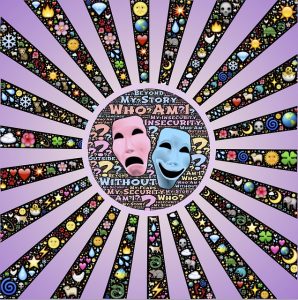Drama Games in KS3
Drama is a subject that brings a wealth of educational benefits to pupils. In school drama, teachers teach drama. However, sometimes the fully qualified drama teaching is not available. Read this blog to get ideas for popular drama games to play when you cover a drama class.
Why do drama and drama games in KS3 matter?
Drama is important for building confidence and helping children to develop communications skills.
According to the Pyjamadrama experience, drama also helps pupils to develop concentration and creativity. Through drama, children learn to understand the world around them, communicate and cooperate. Opportunities to perform also contributes to physical development. It also supports the development of language and numerical skills. Above all, drama helps to build and sustain friendships.
A very brief drama history in schools
Plato’s philosophical objective saw drama excluded from formal education for many centuries. It was not until Jesuit Schools (1534) brought back Aristotelian’s love of theatre into their educational focus.
Nowadays, drama lessons contribute to schools’ curriculums worldwide. The importance of drama as part of an educational programme is traceable to the Ancient Greeks.
Nowadays, the subject of drama has firmly entered schools’ curriculum worldwide. Many schools employ fully qualified drama teachers. Students can choose to do drama GCSE and A-levels as well as professional drama qualifications.
However, what to do in a drama lesson when their fully trained drama teacher is not available. The problem is familiar to many teaching in pre-GSCE KS3 classes, especially in the winter season of colds and flues.

Ideas for drama games in KS3
Drematoolkit thematises games into 12 categories listed below. The categories provide an excellent foundation for a last-minute lesson plan. As the drama teacher, you can decide what direction you would like the session to take. The games can help you and the students imagination and be a lead to further in-depth topic study. Alternatively, the teacher can combine these into a sequence of events that will form a lesson.
- Concentration – nurtures imagination, spontaneity, teamwork. Games: wink murder, the secret leader
- Energy
- Getting To Know You
- Group Cohesion
- Improvisation
- Listening – nurtures imagination, concentration, spontaneity. Games: circle story, change places if, shape fitter
- Mime – boosts character, confidence, improvisation. Games: charades and name gesture
- Plot
- Thinking Skills
- Trust – nurtures Confidence, Teamwork. Games Trust circle, trust fall and trust plank.
- Voice & Dialogue
- Character
Further resources are available to download from the TES teaching resource site. The page contains many free highly-rated drama games in KS3 as well as KS1 and KS2.
Besides, there are many brilliant drama workshops which offer drama curriculum enhancement. The workshops are also suitable for the benefited learning in a range of other curriculum subjects such a PSHE, history, geography and languages.


